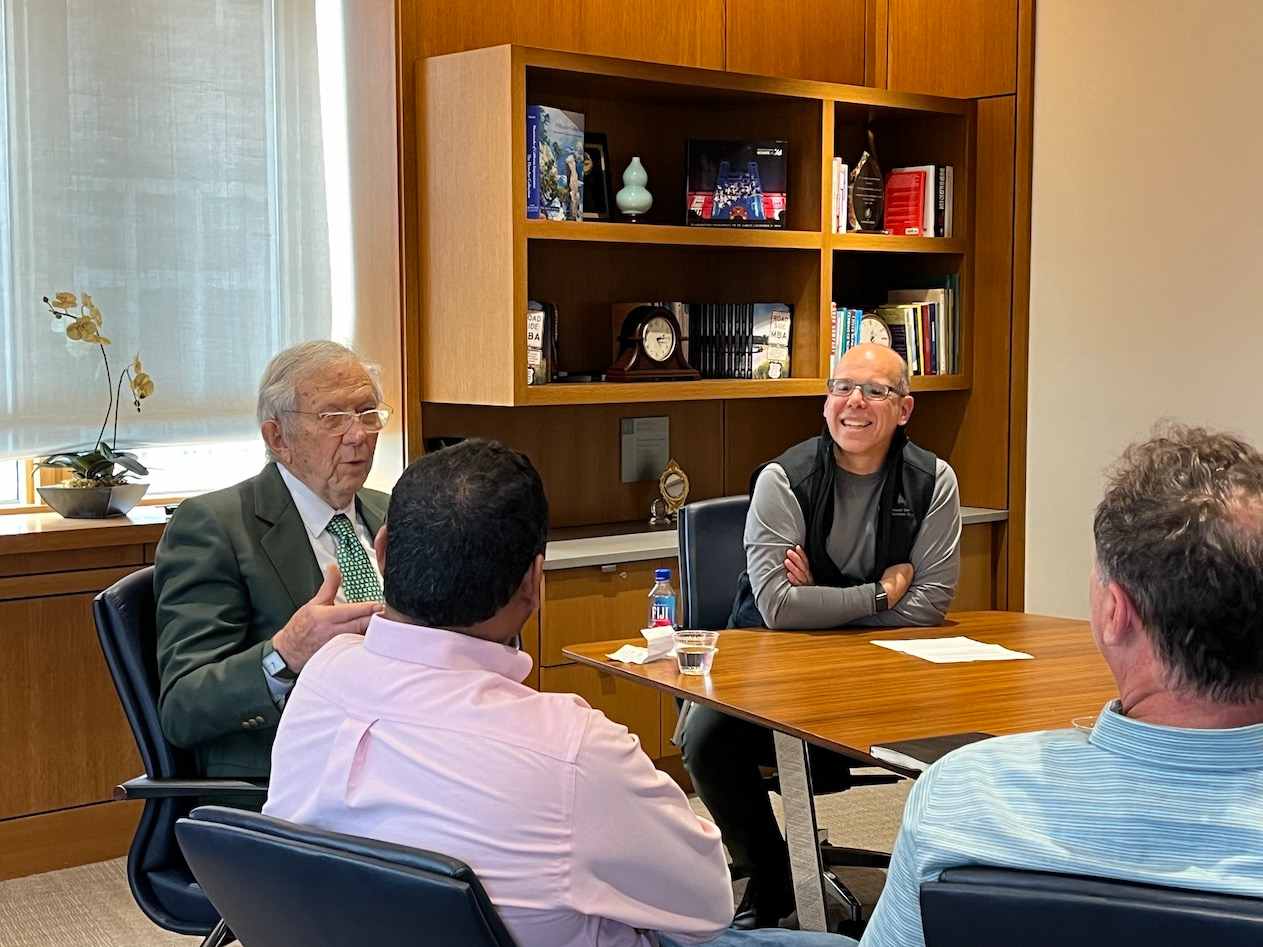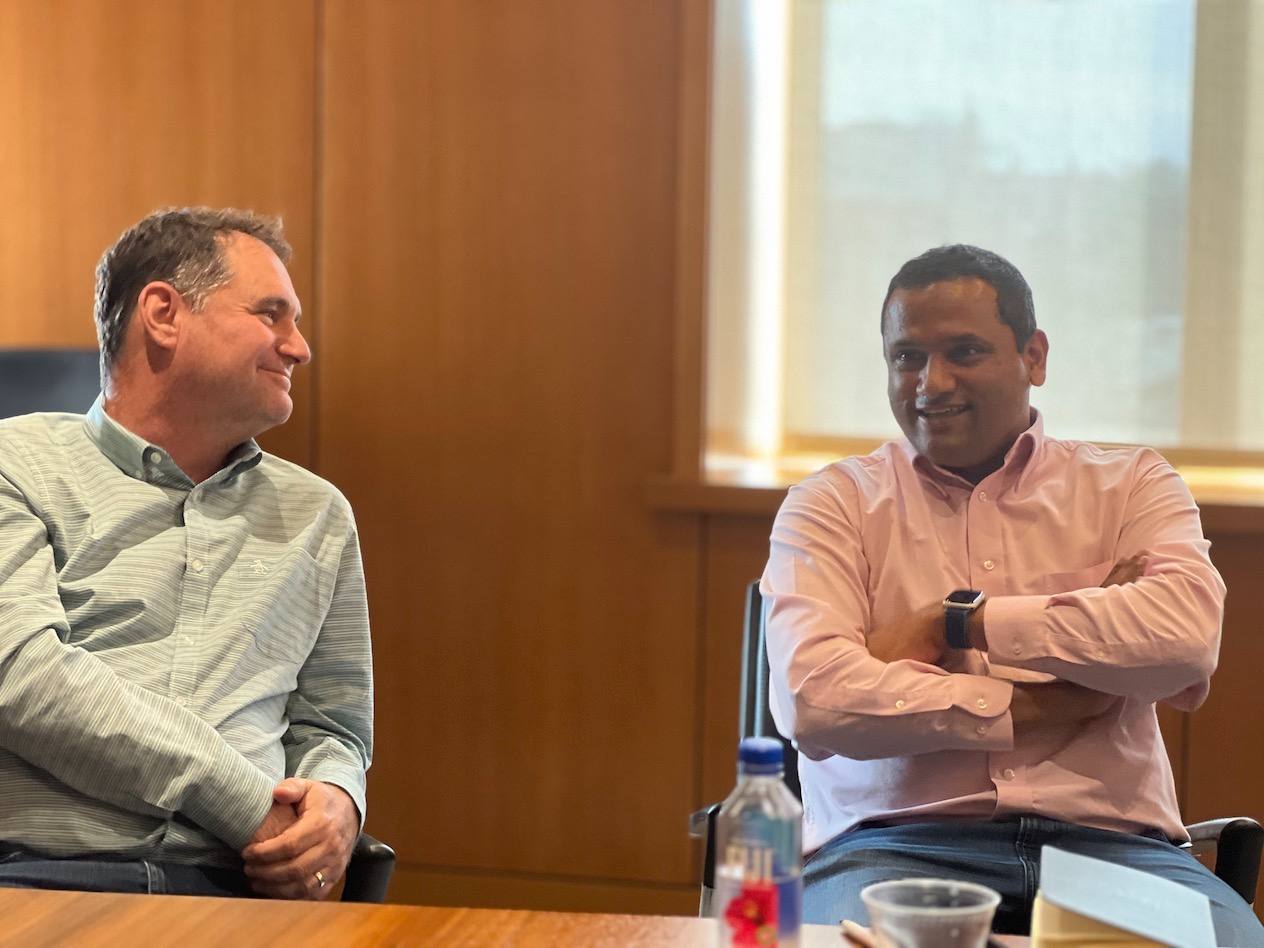Olin Award: Research That Transforms Business
Established in 2007, the Olin Award recognizes the important impact that scholarly research by WashU Olin faculty can have on business results.
Each year, faculty members submit papers for consideration, and the papers are judged by a group of national business executives and educators. Richard Mahoney, Olin distinguished executive in residence and former chairman and CEO of Monsanto, initiated the award to promote scholarly research that has timely practical applications for complex management problems.
Winner(s) receive a $25,000 honorarium.
Olin Award 2024
Watch Nick Argyres and Durai Sundaramoorthi discuss their work and how it can be applied to everyday business practices.
The winners of the 2024 Olin Award are Nick Argyres, Olin’s Vernon W. & Marion K. Piper Professor of Strategy, and Durai Sundaramoorthi, a professor of practice in data analytics.
Mazzeo praised Argyres’ research for offering valuable insight into how some firms quickly develop future innovations—spawned by their existing innovations. “It turns out a well-connected internal researcher network can hugely benefit a firm. And that has important implications for managers, who can influence researchers’ connectedness.”
The paper, “Internal Network Structure and the Speed of Generative Appropriability,” is under review at Strategic Management Journal. Mazzeo said one judge noted the paper provides “very positive additions to organization strategy and structure considerations.”
Mazzeo praised Sundaramoorthi's paper, “Management of Resource Sharing in Emergency Response Using Data-driven Analytics” for coming up with “a powerful way to address supply shortages in emergency situations”— such as the ventilator shortage in hospitals during the Covid pandemic.
Read the research summaryYour models to share resources show a way to meet 98% of the demand in a group of highly stressed states and almost 100% of the demand in other states.
—Dean Michael J. Mazzeo
2024 Olin Award announcement
The winners met with Dean Mike Mazzeo and Richard Mahoney in the dean's suite.



Past Winners
-
2023 Winner
The winners of the 2023 Olin Award are the authors of “Nip It in the Bud! Managing the Opioid Crisis: Supply Chain Response to Anomalous Buyer Behavior.” The paper is by Seethu Seetharaman, the W. Patrick McGinnis Professor of Marketing and co-director of the Center for Analytics and Business Insights (CABI); Michael Wall, professor of practice in marketing and entrepreneurship and co-director of CABI; Anthony Sardella, adjunct lecturer and senior research advisor at CABI; and Annie L. Shi, a doctoral student in marketing. The researchers developed a process for flagging suspicious transactions across 100 pharmaceuticals—a process with a stunningly high level of precision and one that can immediately take aim at curbing the country’s opioid epidemic. Read the research summary.
-
2022 Winners
The winners of the 2022 Olin Award are the authors of “SPACs and Forward-Looking Disclosure: Hype or Information?” The paper is by Kimball Chapman, assistant professor of accounting; Richard Frankel, Olin’s Beverly & James Hance Professor of Accounting; and Xiumin Martin, professor of accounting. They explored whether SPACs (special purpose acquisition companies) take advantage of an apparent exemption from prosecution under the Securities Act of 1933 to hype forward-looking disclosures to deceive shareholders. SPACs have allowed many companies to raise more funds without evidence that allowing forecasts misleads investors, the research found. And they have propelled innovation in a range of industries, including healthcare, electric vehicles and space exploration. Read about the research.
-
2021 Winner
Anne Marie Knott, the Robert and Barbara Frick Professor of Business at Olin, wrote “RQ Innovative Efficiency and Firm Value,” published in the Journal of Financial and Quantitative Analysis. RQ is short for research quotient, which is measured as the output elasticity of research & development (R&D). First developed by Knott in 2008, RQ can be estimated for any firm reporting R&D. Knott’s winning paper explores RQ’s ability to serve as a robust measure of a firm’s innovation for the finance audience. R&D is the primary source of growth for 40% of companies, “yet companies are flying blind with respect to the R&D because they lack good metrics,” Knott says. The front-end implication of flying blind is that companies don’t know how much to invest in R&D. “Only 4% of companies invest within plus 10% of optimal levels. The remaining 96% of companies are leaving an average of $182 million of foregone profits on the table each year.” Read the research summary.
-
2020 Winner
Assistant Professor of Operations and Manufacturing Management Dennis Zhang authored “Predicting Human Discretion to Adjust Algorithmic Prescription: A Large-Scale Field Experiment in Warehouse Operations,” which thoroughly examined the application of a human-centric algorithm in assembly-line bin packing for Chinese online retail giant Alibaba. “Today, the adoption of artificial intelligence (AI) and robotics is accelerating and revolutionizing business operations by augmenting human work,” Zhang and co-authors Jiankun Sun of Imperial College Business School, Haoyuan Hu of the Alibaba Group and Jan A. Van Mieghem of Northwestern University wrote in their award-winning paper. “Indeed, rather than striving for autonomous automation, we believe that AI and robotics can improve human work by providing more decision support while always empowering human judgment, oversight and discretion.” Read the research summary.
-
2019 Winners
Assistant Professor of Operations and Manufacturing Jake Feldman and Assistant Professor of Operations and Manufacturing Management Dennis Zhang co-authored “Taking Assortment Optimization from Theory to Practice: Evidence from Large Field Experiments on Alibaba,” which sought to answer the question of how to recommend products in an online retail environment that will maximize revenue and provide the most useful choices for consumers. Their research—with Chinese online retail giant Alibaba—tested the limits of machine learning technology, leavening it with customer-choice methodologies from a half-century ago. The pair’s resulting algorithm refined the product choices Alibaba retailers offered to 13 million customers in a single week, leading to a 28% revenue increase—$21.6 million—in that period. The results were so conclusive, Alibaba adopted the new product selection model. Read the research summary.
-
2018 Winners
Professor of Operations and Manufacturing Management Lingxiu Dong and Senior Lecturer in Management Durai Sundaramoorthi co-authored “Machine Learning Based Simulation and Optimization of Soybean Variety Selection” describing the analytics-based framework they developed to optimize a farmer’s crop yield each season. The researchers harness seven years of data spanning 350 farm sites and 182 seed varieties to compare soybean yields in different weather conditions. The researchers go a step further by developing a web-based application that allows growers to simulate crop yields under different weather conditions at any target farm. Even more, their framework works for crops other than soybeans and can help address business problems outside of agriculture in areas such as HR, finance, retail and beyond. Read the research summary.
-
2017 Winner
Assistant Professor of Marketing Arun Gopalakrishnan co-authored “A Cross‐Cohort Changepoint Model for Customer-Base Analysis” with Eric T. Bradlow and Peter S. Fader of Wharton School, University of Pennsylvania. The paper introduces a framework for analyzing data that reveals insights into patterns of customer behavior over time. The researchers found that new customers are not simply going to behave like the “average” existing customer. The new mathematical model takes into account what it calls “regime changes” or past customer behavior changes that were influenced by new firm policy, government regulations, economic factors, competitors’ actions or unknown drivers of change.
-
2016 Winners
Professors Radha Gopalan and Todd Milbourn co-authored, “Compensation Goals and Firm Performance,” which sheds light on the costs of linking compensation to performance targets. While linking executive compensation to specific performance goals is an accepted and widely used practice that provides strong incentives to top management intended to make pay contracts more transparent, the researchers have discovered a dark side to performance-based contracts. Based on analysis of executive pay and performance at the 750 largest firms by market capitalization between 1998 and 2012, they discovered what happens when managers try to game the system to meet, beat or lowball performance goals.
-
2015 Winners (tie)
Anne Marie Knott, professor of strategy, authored the paper “Explaining the Broken Link Between R&D and GDP Growth” (PDF). Professor Knott’s study documents the disconnect between R&D and GDP growth and then uses a novel measure, RQ (research quotient), to show that it coincides with a 65% decline in firms’ R&D productivity. The study reveals that there is a key culprit in RQ decline. Since that culprit is easily reversed, it’s likely R&D can again drive firm and economic growth.
Andrew Knight, assistant professor of organizational behavior, co-authored “Who Defers to Whom and Why? Dual Pathways Linking Demographic Differences and Dyadic Deference to Team Effectiveness” with Aparna Joshi, The Pennsylvania State University. The research explains what drives interpersonal influence in teams and connects patterns of influence to team performance. The findings suggest a number of practical steps that leaders can take to increase the productivity of multidisciplinary teams.
-
2014 Winner
Lamar Pierce, associate professor of strategy, co-authored "Cleaning House: The Impact of Information Technology Monitoring on Employee Theft and Productivity" (PDF), with Daniel Snow, Brigham Young University and Andrew McAfee, MIT. The researchers examine how investments in technology-based employee theft monitoring can improve profitability by both reducing misconduct and increasing productivity.
Olin Award Winner Archive
-
2013 Winners
Baojun Jiang, assistant professor of marketing, co-authored "Pricing and Persuasive Advertising in a Differentiated Market" (PDF) with Kannan Srinivasan, professor of international business, Carnegie Mellon Tepper School of Business. The researchers examine how competitive firms’ pricing and persuasive advertising strategies, as well as profits, are affected by changes in consumer preferences, unit production costs, and advertising efficiencies. Read the research summary.
-
2012 Winners
Tat Y. Chan, associate professor of marketing; Chunhua Wu, PhD marketing student; and Ying Xie, associate professor of marketing, co-authored the 2012 winning Olin Award paper: “Measuring the Lifetime Value of Customers Acquired from Google Search Advertising.” The researchers developed a method to measure the value of Google pay-per-click advertising, taking into account both online purchases and the potential for “cross-channel sales spillover” when online customers purchase goods or services offline.
-
2011 Winners
Radhakrishnan Gopalan, assistant professor of finance; Todd T. Milbourn, Hubert C. and Dorothy R. Moog Professor of Finance; and Anjan V. Thakor, director of the PhD program and John E. Simon Professor of Finance, co-authored the 2011 winning Olin Award paper “The Optimal Duration of Executive Compensation: Theory and Evidence.” This new research offers an evidence-based model to help the board of directors align the duration of the CEO’s compensation with the strategic needs of the company.
-
2010 Winner
Judi McLean Parks, Reuben C. and Anne Carpenter Taylor Professor of Organizational Behavior, co-authored "Give and Take: Incentive Framing in Compensation Contracts" (PDF) with James W. Hesford, assistant professor of accounting, Cornell University. The research examines the relationship between different forms of compensation (performance contingent and salary) and fraudulent behavior.
-
2009 Winners
Markus Baer, assistant professor of organizational behavior; Kurt Dirks, professor of organizational behavior; and Jackson Nickerson, Frahm Family Professor of Organization and Strategy, co-authored "A Theory of Strategic Problem Formulation."
-
2008 Winners
Jackson Nickerson, Frahm Family Professor of Organization and Strategy, and Todd Zenger, Robert and Barbara Frick Professor of Business Strategy, co-authored “Envy, Comparison Costs and the Economic Theory of the Firm.”


